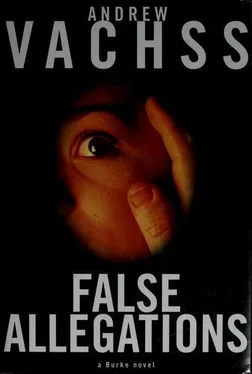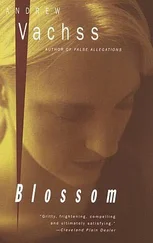"You nail it."
"Sure. Once you've proved the existence of the trauma, the question becomes, What else could cause this totality of data? When we cross–compare to other, documented cases, the task simplifies radically."
"So when they say kids make lousy witnesses, that they have different memories…?"
"Kids may not be articulate, Mr. Burke. But they are great communicators. Their internals speak volumes—it's just a matter of gathering the data, developing the protocols, training the personnel….It can be done. And we're doing it, right here."
"How much does all this cost?" I asked him.
"In real money?" he shot back.
"What does that mean?"
"The work we're doing on your…client, that's the gold standard. Best of everything. When you include the full week's stay, all the personnel involved, the tests themselves…it's costing your Mr. Kite around fifteen thousand dollars."
"Damn! So there's no chance of all kids—"
"All kids don't need this extensive a workup," he said. "And our children's program is about ninety per cent subsidized. As we treat children, we also gather data for our research. Most of the kids don't have insurance anyway. In fact, you're our first true paying customer. Once this is standardized, once the computer programs are set up, the costs will drop precipitously."
"You can't set up field hospitals in every city," I said. Thinking of politicians closing AIDS wards to save money.
"No, and we don't have to. Once local personnel are trained to do the initial screening, our methods will be called upon only in the most difficult cases."
"So what you really need is…?"
"That's right, Mr. Burke. Money. We need about fifteen to twenty million dollars to finish the research, publish it, defend it…and make it exportable. But we're already doing the work…and the money will come," he said, hope and faith tangling in his voice.
"Girl call," Mama said.
It was around ten o'clock at night, and I'd invested over an hour walking around trying to find a pay phone that looked safe. I wasn't in the mood for mystery. "What girl?" I asked her.
"Say Pepper. You call her, okay? Very important."
"Yeah, okay. Anything else?"
"No."
"I'll call you—"
"You want Max?" Mama interrupted.
"Not down here," I told her. "I'll be back soon."
"Is Pepper around?"
"That's me, Chief," the Pied Piper girl's voice bounced over the long–distance line.
"I got a message to—"
"Delta flight six eighty–two to Atlanta tomorrow morning at six–twenty a.m. Can you be on it?"
"Maybe. Why should—?"
"When you arrive, stay in the Delta terminal. Meet flight six oh three from La Guardia, okay? You can catch a return at three in the afternoon."
"There's isn't much time to—"
"You already have reservations, round trip, Mr. Haines," Pepper said, mocking the voice of a super–efficient secretary. "You had enough frequent flyer mileage on Delta for an upgrade too, so you'll be going first class. Will there be anything else?"
"No. Thanks a lot," I told her. Especially for the message that the Arnold Haines ID was all shot to hell.
Icame out of the deplaning chute carrying the black aluminum attaché case in one hand. In a medium–blue two–button suit, clean–shaven with my hair combed, I was an anonymous fish in the entrepreneur stream that clogs the hub airports every weekday.
My flight had been almost a half hour late. I was thinking of where to meet Wolfe when I spotted her standing behind the barrier. Hard to miss in that sunburst–yellow silk dress with the long strand of black pearls the only decoration down the front. Her hair was in a French braid, the white wings prominent against her high forehead. She raised her hand and waved, a smile sparking across her lovely face.
For just a piece of a minute, I felt like a man coming home to his wife. Or what I thought that would feel like, anyway. I shrugged it off, not grieving for what I'd never lost.
Wolfe gave me a kiss on the cheek, took my arm and steered me away from the gate. If you were watching, you'd never guess it was business. She was a pro, all the way.
"It's probably better if we find somewhere to sit," she said. "You have breakfast?"
"Not really. Airplane food…"
"Me too," she said. "I know a good place. Come on."
We ordered Atlanta breakfast sandwiches—sausage wrapped in French toast. Wolfe poured maple syrup over her sausage like it was mustard on a hot dog, but I didn't have the heart for that. She had black coffee; I had apple juice.
"I heard something," she finally said. "I don't know if it's true. But I didn't want to wait to tell you. And I didn't want to use the phone."
"About the—"
"Yes. Brother Jacob is on the Internet. At least, Chiara thinks it's him—she's the one who works the computers for us. There's a room on the Web. The server's somewhere in Europe, near as we can tell. When you go in, it looks like it's all about bringing Asian women to America. For marriage. You know, stuff about immigration laws."
"So?"
"There's a whole line of chat about 'dowries.' It sounds like they're trafficking."
"He wants to buy a girl to bring here and marry?"
"No. Chiara says there's a subtext. Not straight–up encryption, but some kind of code. She's still working on it, but where she is now, she thinks he has some kind of merchandise he's offering."
"Not a one–time sale?"
"No. A regular line of it. Whatever it is."
"Can you…?"
"I don't know," she said softly. "It's a delicate probe, going in like this. If I was still on the job…"
"I may know someone," I told her. "A cop."
"Do I know him?"
"Morales."
"Oh yes , I know him," she smiled. "The only difference between him and a dinosaur is he's not stupid."
"He likes you too," I said.
We killed an hour or so just walking around the airport, Wolfe's hand on my arm. I told her I had to make a phone call. Went and bought her a white rose at the florist shop. She gave me a kiss and boarded her flight, not looking back.
I had a couple of hours to kill before my flight. I got a shoeshine, prowled through a bookstore, just walked around. Then I worked the pay phones.
Every line I'd thrown out was reeling in the same kind of fish. Every tile dropped onto the mosaic was different, but I already knew what picture was going to appear when it was done. So when I met with Perry for the last time the next morning, I wanted it without the frills.
"Bottom line, doctor: Is she telling the truth?"
"Well, she signed the release, so…First of all, let me start by saying that whatever you do, encourage your client—Jennifer—to get some help. I can give you some names of good therapists in her community. I discussed this with her and she seemed somewhat resistant…she said she's already in therapy, but judging from the test results, I…"
"I'll talk to her about it," I said, guiding him back to what I needed to know.
"All right. Good. Anyway, she has a set of primary symptoms—anxiety, dissociation, dysphoria, profound sleep problems, increased startle response, recurring intrusive ideations about specific humiliating experiences, poor self–esteem—all consistent with any number of DSM–Four diagnostic labels. But the most important aspect of her symptoms is that they do appear to be cue–specific. And in this regard, she would meet diagnostic criteria for PSTD. And for a dissociative disorder as well—a whole host of apparently benign cues produce dramatic heart rate increases, which are followed by classic dissociative responses."
Poor little bitch, I thought. Hung out to dry, trained to dance so hard she kept it up even when the music stopped. But every time she heard that music again…"Sure," I said, "but is she—?"
Читать дальше











